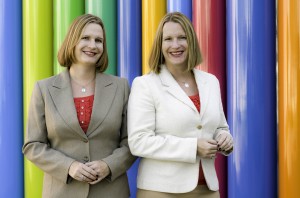You might ask yourself: what exactly is an Entrepreneurial Linguist and where did the term come from?

We like to think of ourselves as the original Entrepreneurial Linguists. Photo by Ulf Buchholz, shot in downtown Vegas, 2012
We started using the term to describe ourselves a few years ago. When Judy developed a workshop based on what she learned in business school, we titled it “Entrepeneurial Linguist,” and it was well received. Now Judy writes the monthly Entrepreneurial Linguist column for the American Translators Association’s Chronicle and gives her workshops around the world.
We would like to turn every single one of our colleagues around the world into an Entrepreneurial Linguist instead of “just” a linguist. It can be overwhelming to be both a languages professional and a businessperson, but there’s a lot of collective knowledge in the languages community. We are also happy to help. Visit our blog, where you can find useful information as well as tips and tricks for your business or book a customized consulting session with Judy. Our Entrepreneurial Linguist book is available now.
Let’s start with a small paradigm shift that will benefit us all professionally. Most of us are humanists, and as such, we don’t have much of a business background. Are “money” and “compensation” things we don’t feel comfortable discussing? Why? After all, we are running businesses. Linguists are very much in demand in the global marketplace, we have very specific skills that are of utmost importance for any corporation that does business on a global scale. Start thinking of yourself as an essential part of the international communications chain, and price your services accordingly. Let’s collectively work on our Entrepreneurial Linguist mindset!
We have listed a few of the most important Entrepreneurial Linguist characteristics below. Does this sound like you?
Entrepreneurial Linguists:
- are aware of many important lessons from economics, accounting, entrepreneurship
- love what they do
- are professional translators/interpreters who act like businesspersons
- rethink traditional work models
- analyze their industry and stay abreast of changes
- are at the forefront of new developments and new technologies
- never stop learning and questioning
- don’t think that being both a linguist and a successful entrepreneur is a contradiction (it’s not)
- sell their services to clients at a fair and adequate price and make a comfortable living
- maximize their resources – both time and money – and work mainly with direct clients
- build and grow professional relationships on a continuous basis
- constantly acquire new clients
- give back to their communities by doing volunteer work

